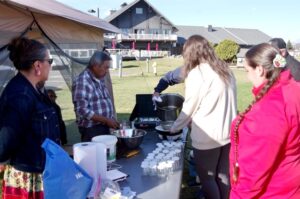Mshkiki gathering teaches participants about traditional medicines

By Rick Garrick
THUNDER BAY — Bear grease teachings were featured during the Anishinabek Employment and Training Services and Kinoomaadziwin Education Body’s Mshkiki gathering on Oct. 24-25 at the Best Western Plus NorWester Hotel and Conference Centre in Thunder Bay.
“I handled bear fat, I convert that through teachings of the bear grease and I went further — I went and shared teachings of different plants that we add to that,” says Biigtigong Nishnaabeg Elder Garland Moses, who delivered the bear grease-making workshop. “We end up with a product that is called minigun, minigun is good for pain, pain inside our muscles, our bones. I even say sometimes we have broken heart, our mental is off balance, it’s always nice to know that the bear is here to give us courage to keep on moving in life.”
Elder Moses says the world is all about life, including the plants and animals that the Creator put on Turtle Island for people to use.
“We try to work with other people to share that knowledge and hopefully they will go and pass that on to our generations to follow us,” Elder Moses says. “We’ve got to get back to the land, the land is so important to our survival. Far too often we forget, and when we forget, we let people destroy that land and we have to try to figure out how to put it back together.”
Moses says the Elders used to tell him many years ago that it was time to get back to the traditional way of life.
“Our culture, our history, our traditions because some day, somebody is going to come and visit us,” Elder Moses says. “They’re going to ask us to help them, the world is going crazy and the Anishinabe is the ones they’re going to come and ask, ‘How could you help us? How could we put this back together?’”
Elder Moses says he asked the Elders for help when he quit drinking alcohol more than 50 years ago.
“One of the things they told me [was] to get back into culture, get back into your way of life because it’s only going to help you,” Elder Moses says. “Since them, I’ve met a lot of people [who] have given me a lot of teachings, and I went through years of ceremony in the bush.”
Raphael Moses, a Biigtigong Nishnaabeg citizen who has been learning about traditional medicines since he was a child and wrote and published a book about traditional medicines in 2014, Holistic Adventures, spoke about how he began learning about the traditional medicines during his traditional medicine teachings presentation.
“I was very young and just listening to the Elders,” Raphael says, noting that the Elders didn’t speak Anishinaabemowin to the children back then because of what they had learned in Indian Residential School about not speaking their own language. “What we’re doing today, making bear grease and teaching people about the medicines, that’s part of reconciliation, we have the right to do it in public now.”
Raphael also spoke about how the traditional medicines are used for different conditions as well as the amount of time it takes to harvest them.
“[When] you go out there and harvest Green Boy, it takes anywhere from six-to-eight hours just to collect the plant,” Raphael says. “After that, you take it home and you snip it into quarter-inch pieces. After that, you put it on a table and dry it for up to three days.”
Raphael says he is currently writing a second book about the traditional medicines.
“The first one is all in English,” Raphael says. “The second one is going to be in Anishinaabemowin, and then after that, translated into English.”


